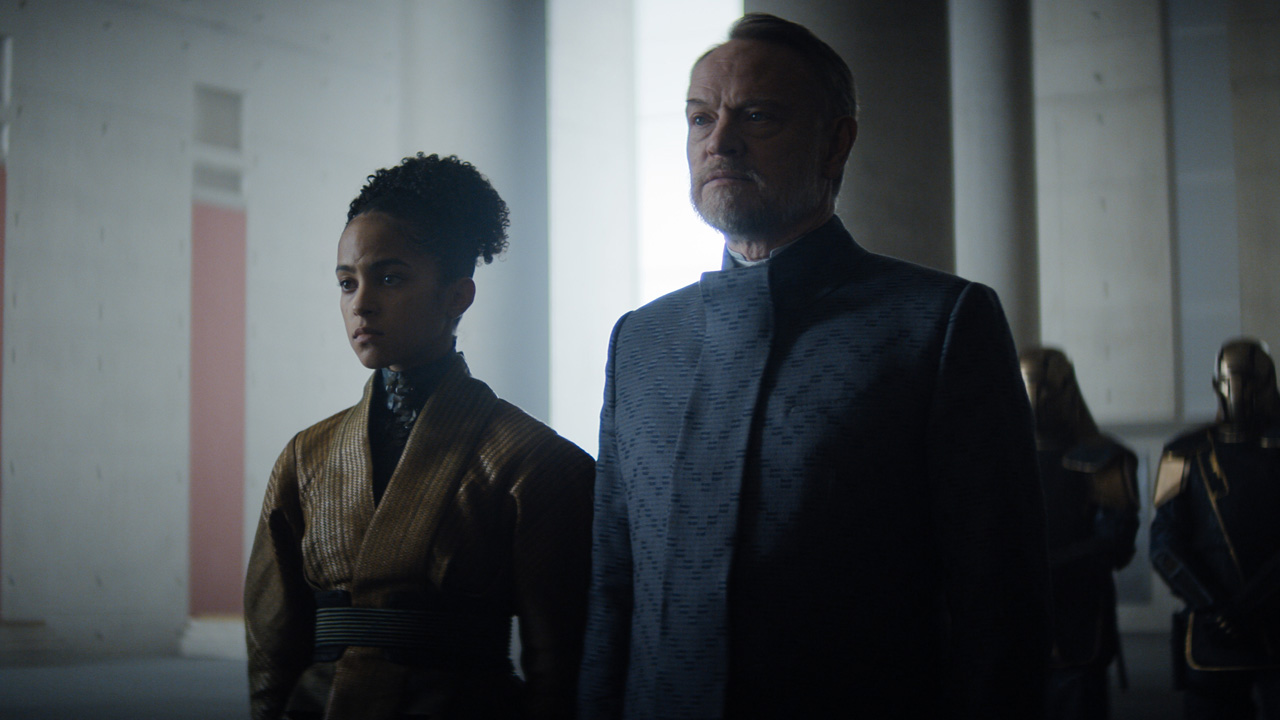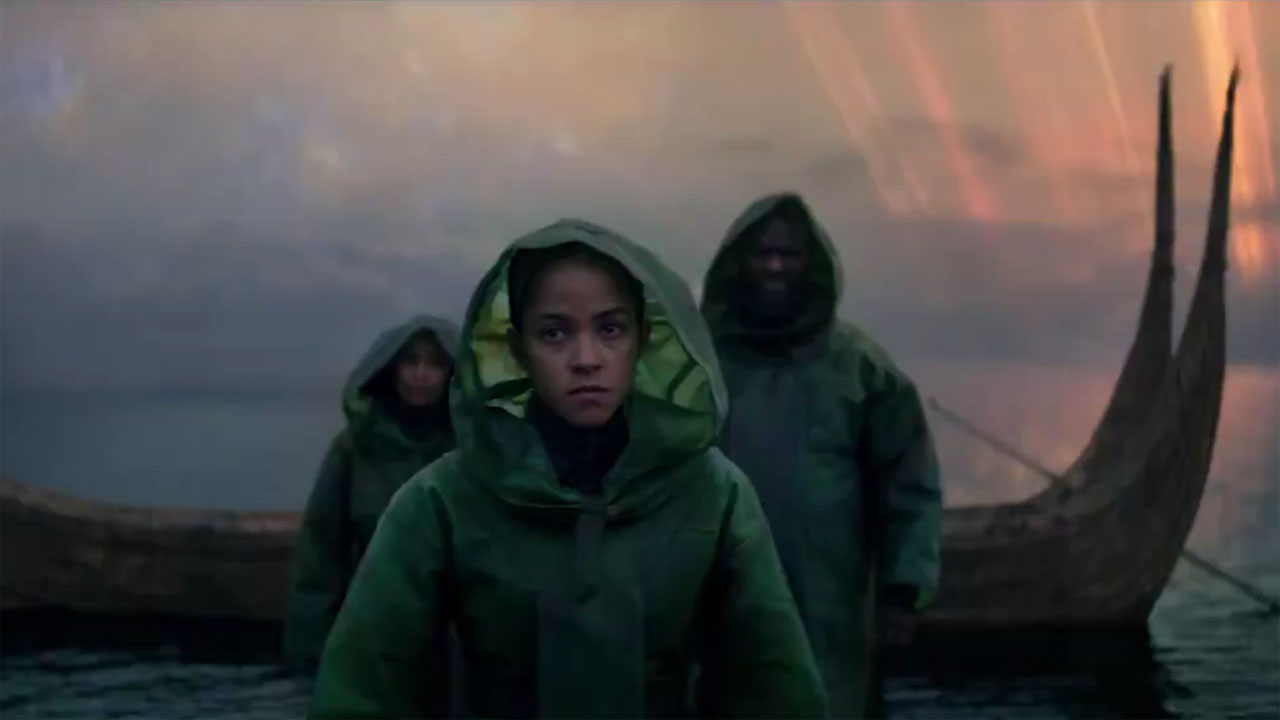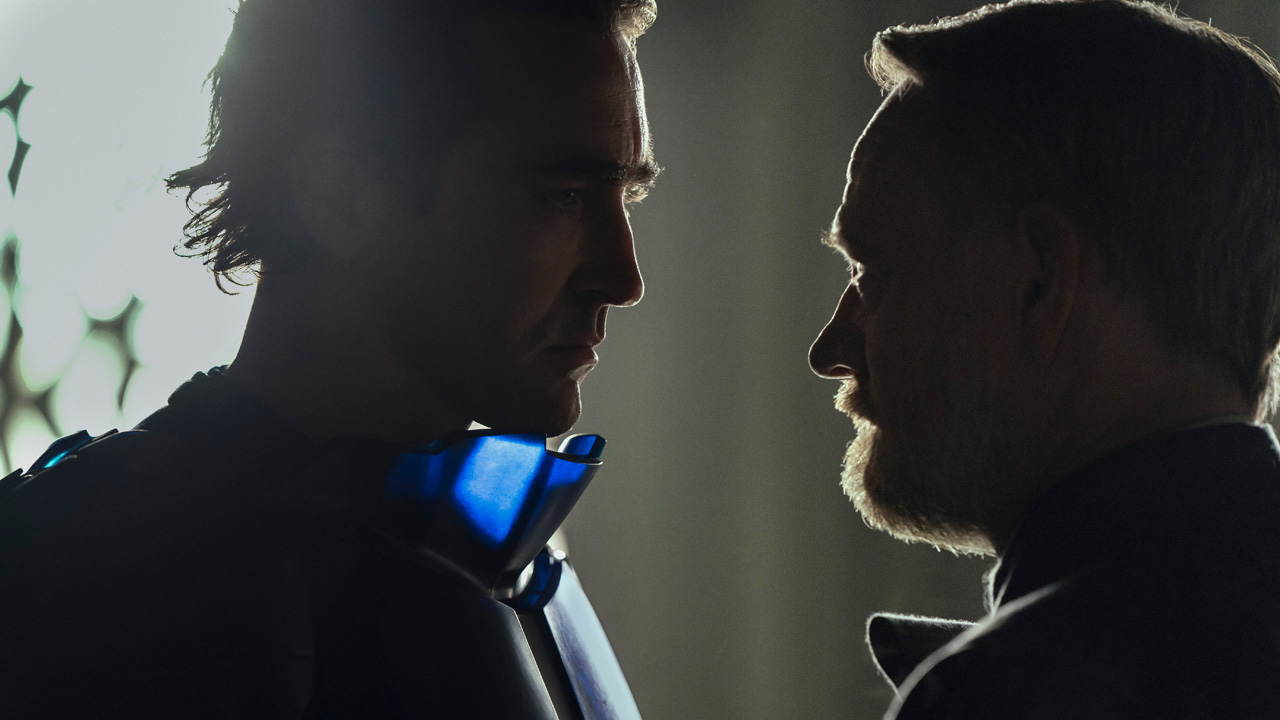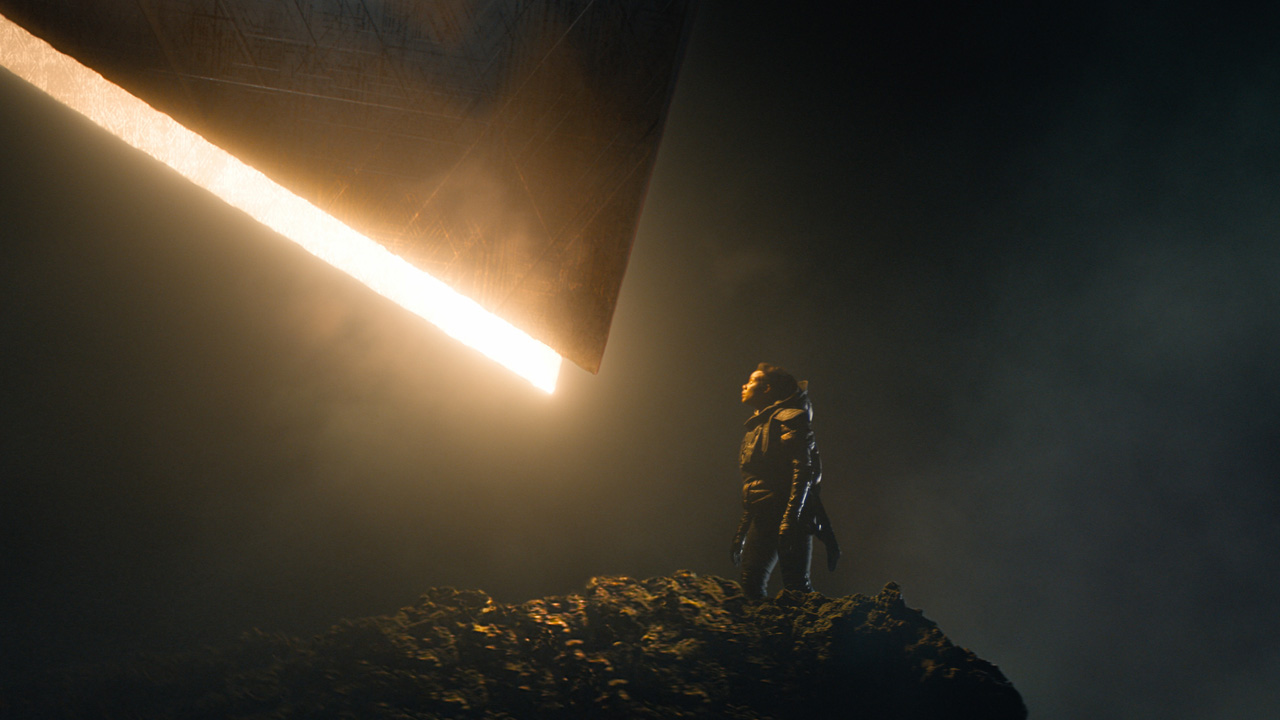
Spoilers follow for Foundation episode 1. Watch it first before reading on.
Apple TV Plus has been a surprise offering during the intensifying streaming war. Netflix, Disney Plus and Amazon Prime Video have dominated in recent years, but Apple has quietly gone about building a back catalog of top-rated movies and shows – including the multi-award winning soccer comedy series Ted Lasso.
- Episode 1 (of 10), 'The Emperor's Peace'
- Written by David S. Goyer and Josh Friedman
- Directed by Rupert Sanders
★★★
Now, Foundation, Apple TV Plus’ new flagship show, aims to be the streamer’s most ambitious and potentially successful production yet. Based on Isaac Asimov’s influential sci-fi book series, Foundation is a sprawling, centuries-spanning tale with a unique premise that should appeal to audiences of a space opera disposition.
On the surface, Foundation’s plot sounds like it’ll be easy to follow. It tells the story of The Foundation, a group of outcasts led by mathematical genius Hari Seldon (Jared Harris) and his understudy Gaal Dornick (Lou Llobell), who seek to save the Galactic Empire from total destruction.
- Check out our review of Foundation episode 2
- This is everything you need to know about Foundation on Apple TV Plus
- Apple TV Plus review
Claiming that the Empire will endure 30,000 years of darkness and civil wars if it doesn’t change course immediately, Selon and Dornick propose that they can shorten that timespan to 1,000 years if certain criteria are met, including the formation of their Foundation. The Empire’s dictatorial rulers – led by the narcissistic Brother Day (Lee Pace) – reluctantly agree. To ensure that the pair’s band of followers doesn’t grow further and threaten to overthrow the Empire’s leaders, though, Brother Day exiles Seldon, Dornick and their disciples to Terminus, a seemingly uninhabitable planet on the outskirts of the galaxy.
So far, so good, right? No exactly. Despite its seemingly straightforward premise, Foundation’s premiere – called The Emperor’s Peace – is at-times hard to follow. As viewers, we’re taken on a whistle stop tour of its main players, key locations and story threads (both mainline and subplots) during its 68-minute runtime without pausing for breath, which doesn’t give us much space to process what’s going on or who these characters are.
It feels like the show is rushing to get its most important plot point – Seldon’s revelation that the Empire is heading for destruction – without investing enough time to introduce us to anything else. Who are these people? What are their motivations? Where did they come from? Why are they integral to Foundation’s story?
Get daily insight, inspiration and deals in your inbox
Sign up for breaking news, reviews, opinion, top tech deals, and more.
These are questions that are likely to be answered in more detail in future episodes. Given the complexity of Asimov’s novels, too, showrunner David S. Goyer probably had a tough time crafting an opening episode (with a limited runtime) that focuses on the essentials and forgoes additional story elements until later entries.
But we need some reason to invest in Foundation’s setting and characters, and its opening episode doesn’t elaborate on why we should. Its planet hopping and sometimes brief character introductions don’t give the show’s premiere enough room to breathe, or give its poignant scenes, such as Gaal leaving her home world of Synnax to work with Seldon, the emotional depth that they require.

Frustratingly frantic as it is right now, Foundation’s pacing issues should iron themselves out as the series progresses. And, in a sense, it’s hard to fault the show for moving quickly – like the source material, Foundation aims to span 1,000 years of human history. So it needs to proceed at a rate of knots to get into the meat of its story.
Foundation’s TV adaptation is as wildly ambitious as the book series, too. The sheer scope of the show is highly impressive, particularly from a visual perspective, with key planets such as Trantor brought to life in extraordinary detail. Sure, it’s VFX-heavy, but a show of this scale needs to be. It doesn’t look tacky, either, thanks to some fairly classy art direction, which emboldens Foundation with a sense of realism despite its far future setting.
The magnitude of Foundation also extends to its sizable cast. Goyer previously described it as ‘Game of Thrones in space’, and the sheer number of characters proves that such a comparison isn’t an absurd one to make. HBO’s live-action take on George R.R. Martin’s fantasy novel series is packed with likeable and detestable characters and, based on its opening episode, Foundation has its fair share of good, bad and morally gray individuals.
Interactions between like-minded individuals, such as Seldon and Dornick, are fairly routine and don’t offer much in the way of suspense. Conversations between those who don’t see eye-to-eye, though, provide plenty of tense moments and, arguably, this is where Foundation shines brightest.
Seeing Seldon and Dornick verbally spar with Brother Day, or the Empire’s prosecutors as they’re tried for treason, makes for entertaining viewing and provides an insight into just how cleverly exploitative they are. Seeing the pair manipulate events in their favor, and sow the seeds of doubt in their adversaries, is riveting and feels very David vs Goliath-esque in its approach.

Day’s interactions with his fellow emperors, too, make for intriguing viewing. Like Day, Brother Dawn (Cooper Carter) and Brother Dusk (Terence Mann) are clones of Emperor Cleon I, the Galactic Empire’s first ruler, so you would suspect that the trio would be in agreement on every decision they make.
And yet they don’t. Despite presenting a united front in public, there’s an immediate underlying tension between them – the adult Day and Dusk, in particular – privately. It’s fascinating to watch and, if future episodes continue to explore the potential fracturing of Day and Dusk’s relationship, we’ll be in for a wild ride. Game of Thrones was so initially enthralling because of its similarly strained relationships, so if Goyer hopes that audiences make comparisons between Foundation and HBO’s adaptation, it’ll need plenty of drama throughout its 10-episode run to keep that momentum up.
Speaking of dramatic moments, Foundation’s first episode only has one significant event, but it’s certainly impactful. The destruction of Trantor’s Star Bridge – which acts as the galaxy’s gateway to its main hubworld – by supposedly Anacreon and Thespin terrorists is a harrowing watch. We only see a fraction of the destruction and the millions of lives lost but, frankly, what we witness is traumatic enough. If similar chaotic and tragic sequences play out during season 1, Foundation will be an emotionally draining watch.
Our verdict

The Emperor’s Peace is an ambitious if awkward start to Apple TV Plus’ latest big production. It struggles to find a balance between methodically introducing its sizable cast, locations and numerous plot points, and progressing at a pace that doesn’t bog it down.
It tries to run before it can walk and, if you forgive the pun, it doesn’t do as good a job at laying the foundations as it probably could've done. As a result, episode 1 can be hard to follow, particularly if you aren’t familiar with Asimov’s book series.
When it belatedly gets going around the 40-minute mark, though, Foundation’s premiere begins to get interesting. The latter half shows that the series has the potential to be a success and, with many of its cast introductions now out of the way, there should be more room for character development, thematic depth and more stimulating story threads.
There’s enough political intrigue and personality clashes to keep viewers engaged, but Foundation will need to lean further into these areas if it hopes to keep its audience entertained. If episode 2 can find a better equilibrium between its many moving parts, we may be in for a wild ride – but the jury is still out for now.
Foundational facts

- Foundation episode 1 marks a series of firsts for its cast and crew. To start with, the series premiere is the first time that director Rupert Sanders has helmed an episode of a TV production. Before that, Sanders' most notable work was 2012 film Snow White and the Huntsman.
- The role of Gaal Dornick is Lou Llobell's first major acting gig. Until Foundation, the Australian actress had only had supporting movie roles in Voyagers and The Pilgrim.
- Foundation is also Lee Pace's first major TV role since Halt and Catch Fire ended in 2017. The Hobbit and Guardians of the Galaxy star has only guest starred on Hong Kong TVB series Flying Tiger 2, back in 2019, between the AMC period drama and his TV return as part of Foundation's cast.
- Foundation is only Finnish actor Laura Birn's second English-speaking TV role. Birn, who plays Eto Demerzel in Apple's TV adaptation, had only featured in one previous English language TV show – 2018 Netflix series The Innocents.
- The characters of Gaal, Eto and Salvor Hardin (Leah Harvey) are male in Asimov's book series. However, in order to update the source material for the modern age, their genders are flipped in the TV adaptation to diversify Foundation's main cast of characters – something Asimov's daughter says that the late author would have "completely embraced".
- Apple's Foundation series is the fourth attempt to adapt Asimov's works in a live-action capacity. New Line Cinema looked to develop a film based on Foundation's mainline trilogy in 1998 but, after the project failed to get going, Columbia Pictures successfully bid for its screen rights in 2009. HBO tried to produce a TV show in 2014 after Columbia's failed attempt, but that production also failed to gain any traction. Apple commissioned a 10-episodes series order in 2018, and the rest is history.
- While Foundation's many live-action productions became trapped in development hell (until Apple stepped in), Asimov's novels did get adapted in another way. In 1973, an eight-part radio series was broadcast on BBC Radio 4, and became one of the first radio serial dramas to be made in stereo.
- Asimov's Foundation book series has been a huge influence on many sci-fi properties over the past 70 years. Star Wars, The Hitchhiker's Guide to the Galaxy, Dune and Futurama all owe aspects of their stories, designs and ideas to Asimov's works.
- Such is its reach, Foundation has even made an impact in the music industry. Rock band Deep Purple's song 'The Mule' is based on the Foundation character of the same name!
New episodes of Foundation debut exclusively on Apple TV Plus every Friday.
As TechRadar's senior entertainment reporter, Tom covers all of the latest movies, TV shows, and streaming service news that you need to know about. You'll regularly find him writing about the Marvel Cinematic Universe, Star Wars, Netflix, Prime Video, Disney Plus, and many other topics of interest.
An NCTJ-accredited journalist, Tom also writes reviews, analytical articles, opinion pieces, and interview-led features on the biggest franchises, actors, directors and other industry leaders. You may see his quotes pop up in the odd official Marvel Studios video, too, such as this Moon Knight TV spot.
Away from work, Tom can be found checking out the latest video games, immersing himself in his favorite sporting pastime of football, reading the many unread books on his shelf, staying fit at the gym, and petting every dog he comes across. Got a scoop, interesting story, or an intriguing angle on the latest news in entertainment? Feel free to drop him a line.